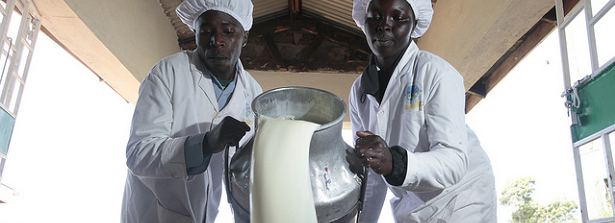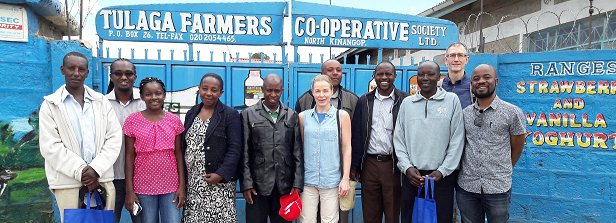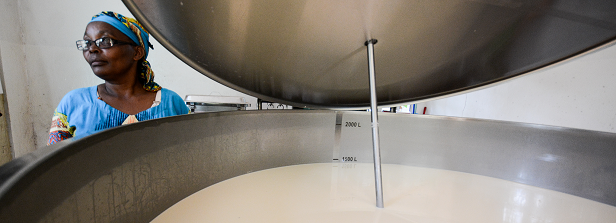Local and International business collaboration for productivity and QUality Improvement in Dairy chains in SE Asia and East Africa (LIQUID)

Duration: October 1, 2015 – October 14, 2020
Project information
Aim: Dairy chains in developing countries are often performing sub-standard, leading to quality losses and economic inefficiencies. Various business models are applied, and in an increasing number of countries international food companies are involved. Little is known on the inclusiveness, effectiveness and scalability of the different business models for improved food and nutrition security. The LIQUID project aims to fill this knowledge gap by doing research, developing capacity and sharing knowledge on how different business models lead to inclusiveness, both in term of income opportunities for farmers and workers, and in terms of availability of quality dairy products for consumers in South-East Asia and East Africa.
Improved collaboration among local and international businesses in value chains can lead to higher productivity and improved quality. This project provides insights and practical tools to strengthen inclusive dairy chains in SE Asia and East Africa, with the aim to improve product quality and farmer income.
Objective: The overall objective of LIQUID is to contribute to an improved food and nutrition security situation in SE Asia and East Africa by studying, capacitating and sharing knowledge on how and under which conditions different business models in the dairy chain provide growth opportunities for smallholders and workers and enhance the availability and quality of dairy products for consumers. In all of the following sub-objectives, gender and youth receives special attention.
Method: The LIQUID project studies dairy development programmes in SE Asia, both their institutional set-up and their effect on producers, workers and consumers. In addition, LIQUID studies local business models in Indonesia, Thailand, Kenya and Tanzania. Finally, the business models applied in SE Asia are compared to business models in the dairy chains of East Africa, adjusted models piloted, and recommendations given to adjust or strengthen international and local business models that have shown to have a positive impact on inclusiveness.
Countries: Indonesia, Thailand, Tanzania and Kenya.
Dutch policy goal: Inclusive business models for food security.
Progress reports
Year 1: LIQUID’s first year focussed on refining the theoretical framework, developing research protocols and setting up the program infrastructure. PhD project proposals have been submitted to the graduate schools of Wageningen University. A communication plan and a website have been developed. A kickoff meeting with all partners was held in February 2016. A training program was developed for the LIQUID PhD students. This training program will also be offered to students in the partner countries. Several MSc theses were written within the LIQUID program. Agriterra has been providing training on sound financial management and good governance in dairy cooperatives.
Summary mid-term review: (1) PhD research in Tanzania found that dairy development support from NGOs is not always aligned with the business models of private private milk processors, potentially leading to unrealistic expectations among the NGO-supported farmers.
(2) Our capacity building and stakeholder consultation activities have focussed on strengthening inclusion, for instance by establishing youth councils at cooperatives, and by starting discussions on women in dairy cooperative.
(3) One of the postdoc projects, comparing informal and formal milk chains, found that milk production in the informal chain is substantially more risky than in the formal chain, particularly for young farmers. Given the uncertainties that farmers in the informal chain face, they are not likely to invest in improving quantity and quality of milk production.
(4) On a methodological note, we learned from an MSc thesis project on dairy cooperatives in Zambia that one cannot rely on information and data available with national assocations in the capital city. Researchers have to visit the cooperatives in order to find out the real situation, which may substantially differ from what is known on paper.
Year 3: LIQUID researchers have given a three-day training program at Egerton University Kenya, training both PhD students and extension officers. A similar training program is scheduled for Sokoine University of Agriculture, Tanzania. Three academic articles have been published and many more have been submitted to international peer-reviewed journals. One policy paper has been published and one is ready to be published soon. Five MSc theses have been written in the framework of LIQUID, often supervised by the PhD students. By providing MSc theses opportunities, LIQUID facilitates that Kenyan and Tanzanian students can work on important development topics and learn to analyse real life problems and to provide solutions. In data collection, PhD students and postdocs have been intensively interacting with local dairy value chain stakeholders such as farmers, cooperatives, district officers and policy makers. By using focus group discussion as data collection tool, researchers not only collect rich data, they also stimulate discussion and awareness among the farmers or extension workers. In visiting and interviewing farmers, it was also made clear to the team that it is not right to just come to collect data, but the team should also bring them the results of the research.



